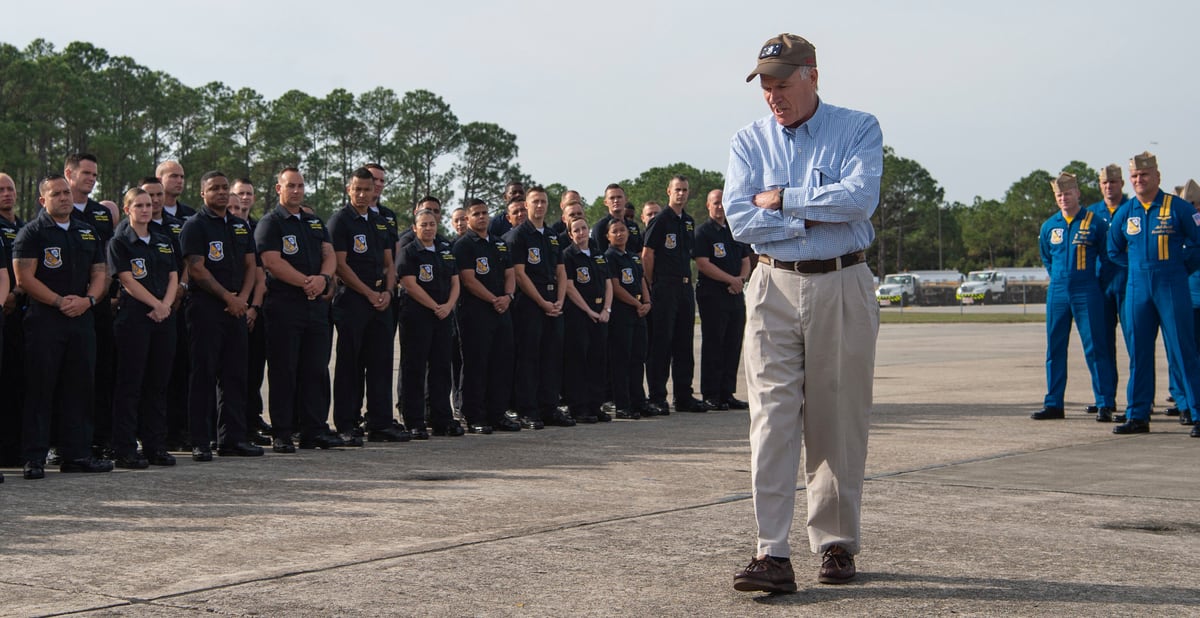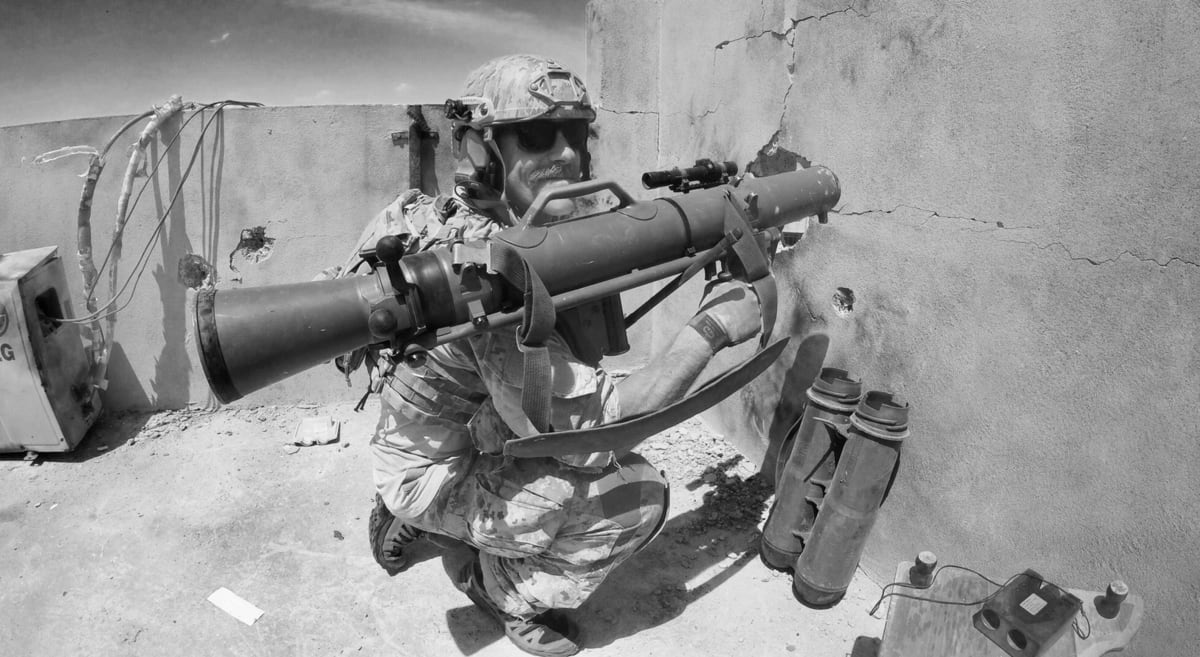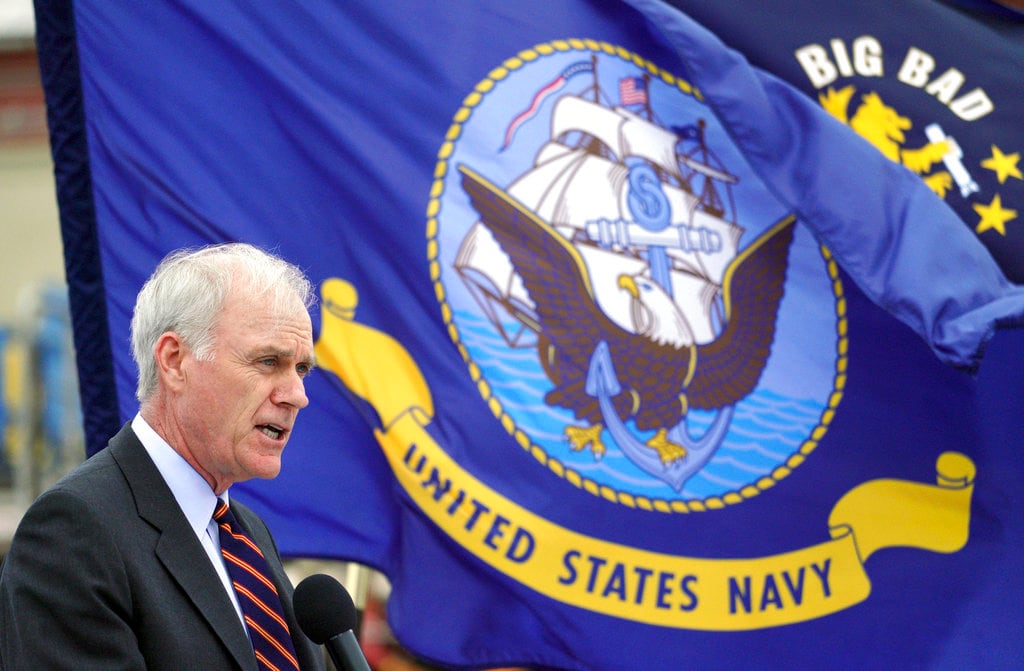HALIFAX, Canada ― Navy Secretary Richard V. Spencer denied Saturday he has threatened to resign over President Donald Trump’s intervention in the case of a Navy SEAL convicted of posing for photos with a dead prisoner of war.
“Contrary to popular belief, I’m still here. I did not threaten to resign,” Spencer said at the Halifax International Security Forum, where Spencer was speaking on a panel about the Arctic. “Let’s just say we are here to talk about to talk about external threats and Eddie Gallagher is not one of them.”
Spencer, the Navy’s top civilian, also said he would comply if Trump orders him to stop plans for a Navy hearing to decide whether to strip Special Warfare Operator Chief Edward “Eddie” Gallagher of his SEAL trident.
Though Trump tweeted Thursday that post-conviction administrative proceedings against Gallagher should be scuttled, Spencer said he does not interpret tweets as the formal orders he would require to act.
“If the president requests that the process stop, the process stops,” Spencer told reporters later. “Good order and discipline is also obeying orders from the president of the United States.”
Spencer said he would not consider resigning if that order comes.
“I mean, the president of the United States is the commander in chief. He’s involved in every aspect of government, and he can make decisions and he can do things and give orders as he deems appropriate,” he said.
RELATED

Spencer’s statements came after NBC News reported that military leaders — hoping to keep Spencer from quitting — lobbied Trump on board Air Force One to stop intervening in Gallagher’s case.
Spencer said he did not know whether those conversations had happened.
A day earlier at the international gathering of national security experts, Spencer told the news agency Reuters that he planned to back the Navy’s top uniformed officials, who initiated post-conviction administrative proceedings to expel Gallagher from the SEALs. “I believe the process matters for good order and discipline,” Spencer told Reuters.
Those comments came after Trump tweeted Thursday: “The Navy will NOT be taking away Warfighter and Navy Seal Eddie Gallagher’s Trident Pin ...This case was handled very badly from the beginning. Get back to business!”
Though military leaders have considered press releases and speeches to constitute policy directives, the flap over Gallagher’s trident has raised questions inside the Pentagon about whether a tweet constitutes a lawful order.

The president has intervened multiple times before and after the court-martial trial for Gallagher, who was accused of murdering a detainee during a 2017 Iraq deployment. Gallagher was acquitted of a string of war crimes charges but found guilty on the sole offense of posing for photos with a dead detainee, a charge he never denied.
Although other members of his platoon, including a commissioned officer, posed alongside him, Gallagher was the only one charged. Believing that Gallagher’s demotion to petty officer first class was too harsh, Trump later restored his chief’s anchors.
After Trump’s clemency, however, Naval Special Warfare commander Rear Adm. Collin Green moved to strip Gallagher’s coveted SEAL trident from him and expel him from the elite teams because of the photo.
Critics contend holding a job qualification board for a SEAL trying to retire from the Navy is merely a punitive exercise, the sort of administrative sanction designed to exact vengeance on young officers or enlisted sailors without the power to fight back.
But supporters say the SEALs have a right to regulate their ranks and evict those who can’t measure up mentally or morally for the job.
Attorneys for Gallagher and three officers who face similar Trident Review Board proceedings have sought guidance from Naval Special Warfare about the status of their cases, only to be greeted with shrugs from the Coronado, California-based command.
Brian Ferguson, an attorney who is helping to represent Lt. Jacob X. “Jake” Portier at the review panel — where he’s been alleged to have failed to quickly inform superiors about a crime a military jury says was never committed — fired off an email to Navy officials trying to find a way out of a potential looming crisis in civil-military relations.
“Various national news outlets are reporting that the Secretary of the Navy and (Rear Adm.) Green are considering resigning over the Trident Review Board process,” Ferguson wrote. "Perhaps this is not in the best interest of the country.
“If your command is willing to entertain ways to resolve this matter without a constitutional crisis, I suspect the attorneys for the sailors would be willing to engage in such a discussion.”
Officials didn’t respond.
Navy Times was unable to confirm other media reports that Spencer ever threatened to resign.
Gallagher’s defense attorney, Timothy Parlatore, believes all parties in the dispute over the boards can use Spencer’s statements in Halifax to build a bridge over what appeared to be a widening gap this week in traditional civil-military relations.
“Everything the secretary said is true and it’s exactly what we’d expect from the secretary of the Navy,” Parlatore said in a telephone interview. “This seems to have been manufactured by the media to create a non-existent crisis.”
But Parlatore questioned why Navy leaders continue to balk at accepting Trump’s tweets as orders "because they don’t like the medium that he uses.
"Do they really want to create a precedent where all orders must be written before they can be obeyed? Does a ship’s captain have to start writing all orders to a junior officer? Does a platoon commander need to start writing orders to his Marines to charge a hill?
“I don’t think the medium the president chose to deliver the orders makes a difference," Parlatore said.
Joe Gould was the senior Pentagon reporter for Defense News, covering the intersection of national security policy, politics and the defense industry. He had previously served as Congress reporter.
Prine came to Navy Times after stints at the San Diego Union-Tribune and Pittsburgh Tribune-Review. He served in the Marine Corps and the Pennsylvania Army National Guard. His awards include the Joseph Galloway Award for Distinguished Reporting on the military, a first prize from Investigative Reporters & Editors and the Combat Infantryman Badge.




